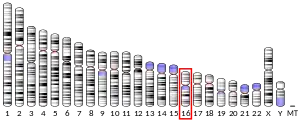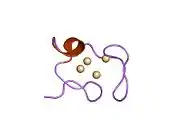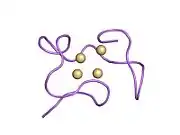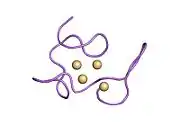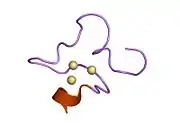Metallothionein 1G
Metallothionein-1G is a protein that in humans is encoded by the MT1G gene.[3][4][5]
| MT1G | |||||||||||||||||||||||||
|---|---|---|---|---|---|---|---|---|---|---|---|---|---|---|---|---|---|---|---|---|---|---|---|---|---|
 | |||||||||||||||||||||||||
| Identifiers | |||||||||||||||||||||||||
| Aliases | MT1G, MT1, MT1K, Metallothionein 1G | ||||||||||||||||||||||||
| External IDs | OMIM: 156353 GeneCards: MT1G | ||||||||||||||||||||||||
| |||||||||||||||||||||||||
| |||||||||||||||||||||||||
| Orthologs | |||||||||||||||||||||||||
| Species | Human | Mouse | |||||||||||||||||||||||
| Entrez |
| ||||||||||||||||||||||||
| Ensembl |
| ||||||||||||||||||||||||
| UniProt |
| ||||||||||||||||||||||||
| RefSeq (mRNA) |
| ||||||||||||||||||||||||
| RefSeq (protein) |
| ||||||||||||||||||||||||
| Location (UCSC) | Chr 16: 56.67 – 56.67 Mb | n/a | |||||||||||||||||||||||
| PubMed search | [2] | n/a | |||||||||||||||||||||||
| Wikidata | |||||||||||||||||||||||||
| |||||||||||||||||||||||||
References
- GRCh38: Ensembl release 89: ENSG00000125144 - Ensembl, May 2017
- "Human PubMed Reference:". National Center for Biotechnology Information, U.S. National Library of Medicine.
- Foster R, Jahroudi N, Varshney U, Gedamu L (Sep 1988). "Structure and expression of the human metallothionein-IG gene. Differential promoter activity of two linked metallothionein-I genes in response to heavy metals". J Biol Chem. 263 (23): 11528–35. PMID 3403543.
- Karin M, Eddy RL, Henry WM, Haley LL, Byers MG, Shows TB (Oct 1984). "Human metallothionein genes are clustered on chromosome 16". Proc Natl Acad Sci U S A. 81 (17): 5494–8. Bibcode:1984PNAS...81.5494K. doi:10.1073/pnas.81.17.5494. PMC 391732. PMID 6089206.
- "Entrez Gene: MT1G metallothionein 1G".
Further reading
- West AK, Stallings R, Hildebrand CE, et al. (1991). "Human metallothionein genes: structure of the functional locus at 16q13". Genomics. 8 (3): 513–8. doi:10.1016/0888-7543(90)90038-V. PMID 2286373.
- Gedamu L, Varshney U, Jahroudi N, et al. (1987). "Structure and expression of the human metallothionein genes". Metallothionein II. Experientia Supplementum. 52. pp. 361–72. doi:10.1007/978-3-0348-6784-9_34. ISBN 978-3-0348-6786-3. PMID 2444457.
- Varshney U, Jahroudi N, Foster R, Gedamu L (1987). "Structure, organization, and regulation of human metallothionein IF gene: differential and cell-type-specific expression in response to heavy metals and glucocorticoids". Mol. Cell. Biol. 6 (1): 26–37. doi:10.1128/MCB.6.1.26. PMC 367480. PMID 3023827.
- Pauwels M, van Weyenbergh J, Soumillion A, et al. (1994). "Induction by zinc of specific metallothionein isoforms in human monocytes". Eur. J. Biochem. 220 (1): 105–10. doi:10.1111/j.1432-1033.1994.tb18603.x. PMID 8119276.
- Strausberg RL, Feingold EA, Grouse LH, et al. (2003). "Generation and initial analysis of more than 15,000 full-length human and mouse cDNA sequences". Proc. Natl. Acad. Sci. U.S.A. 99 (26): 16899–903. Bibcode:2002PNAS...9916899M. doi:10.1073/pnas.242603899. PMC 139241. PMID 12477932.
- Izmailova E, Bertley FM, Huang Q, et al. (2003). "HIV-1 Tat reprograms immature dendritic cells to express chemoattractants for activated T cells and macrophages". Nat. Med. 9 (2): 191–7. doi:10.1038/nm822. PMID 12539042. S2CID 26145639.
- Huang Y, de la Chapelle A, Pellegata NS (2003). "Hypermethylation, but not LOH, is associated with the low expression of MT1G and CRABP1 in papillary thyroid carcinoma". Int. J. Cancer. 104 (6): 735–44. doi:10.1002/ijc.11006. PMID 12640681. S2CID 26461955.
- Cui YP, Wang JB, Zhang XY, et al. (2003). "Using yeast two-hybrid system to identify ECRG2 associated proteins and their possible interactions with ECRG2 gene". World J. Gastroenterol. 9 (9): 1892–6. doi:10.3748/wjg.v9.i9.1892. PMC 4656638. PMID 12970870.
- Gerhard DS, Wagner L, Feingold EA, et al. (2004). "The status, quality, and expansion of the NIH full-length cDNA project: the Mammalian Gene Collection (MGC)". Genome Res. 14 (10B): 2121–7. doi:10.1101/gr.2596504. PMC 528928. PMID 15489334.
- Joshi B, Ordonez-Ercan D, Dasgupta P, Chellappan S (2005). "Induction of human metallothionein 1G promoter by VEGF and heavy metals: differential involvement of E2F and metal transcription factors". Oncogene. 24 (13): 2204–17. doi:10.1038/sj.onc.1208206. PMID 15735762.
- Sun NN, Fastje CD, Wong SS, et al. (2005). "Dose-dependent transcriptome changes by metal ores on a human acute lymphoblastic leukemia cell line". Toxicology and Industrial Health. 19 (7–10): 157–63. doi:10.1191/0748233703th185oa. PMID 15747776. S2CID 14394243.
- Pope SN, Lee IR (2005). "Yeast two-hybrid identification of prostatic proteins interacting with human sex hormone-binding globulin". J. Steroid Biochem. Mol. Biol. 94 (1–3): 203–8. doi:10.1016/j.jsbmb.2005.01.007. PMID 15862967. S2CID 9746088.
This article is issued from Wikipedia. The text is licensed under Creative Commons - Attribution - Sharealike. Additional terms may apply for the media files.
